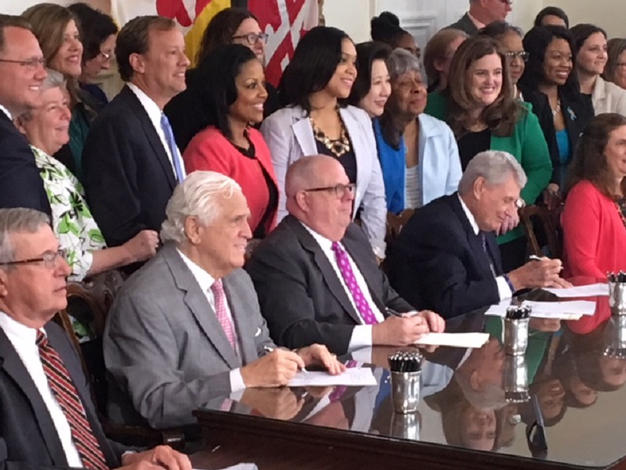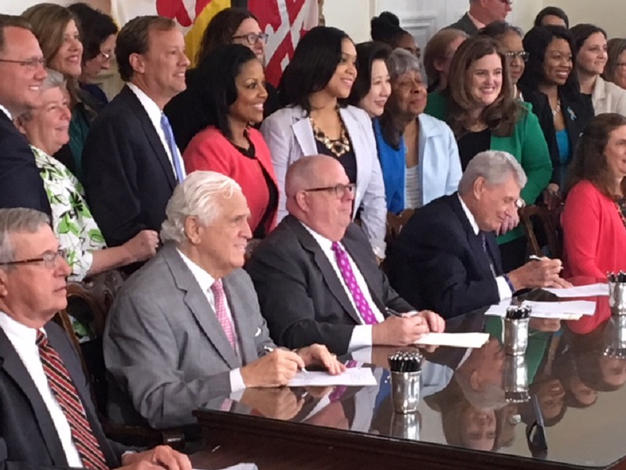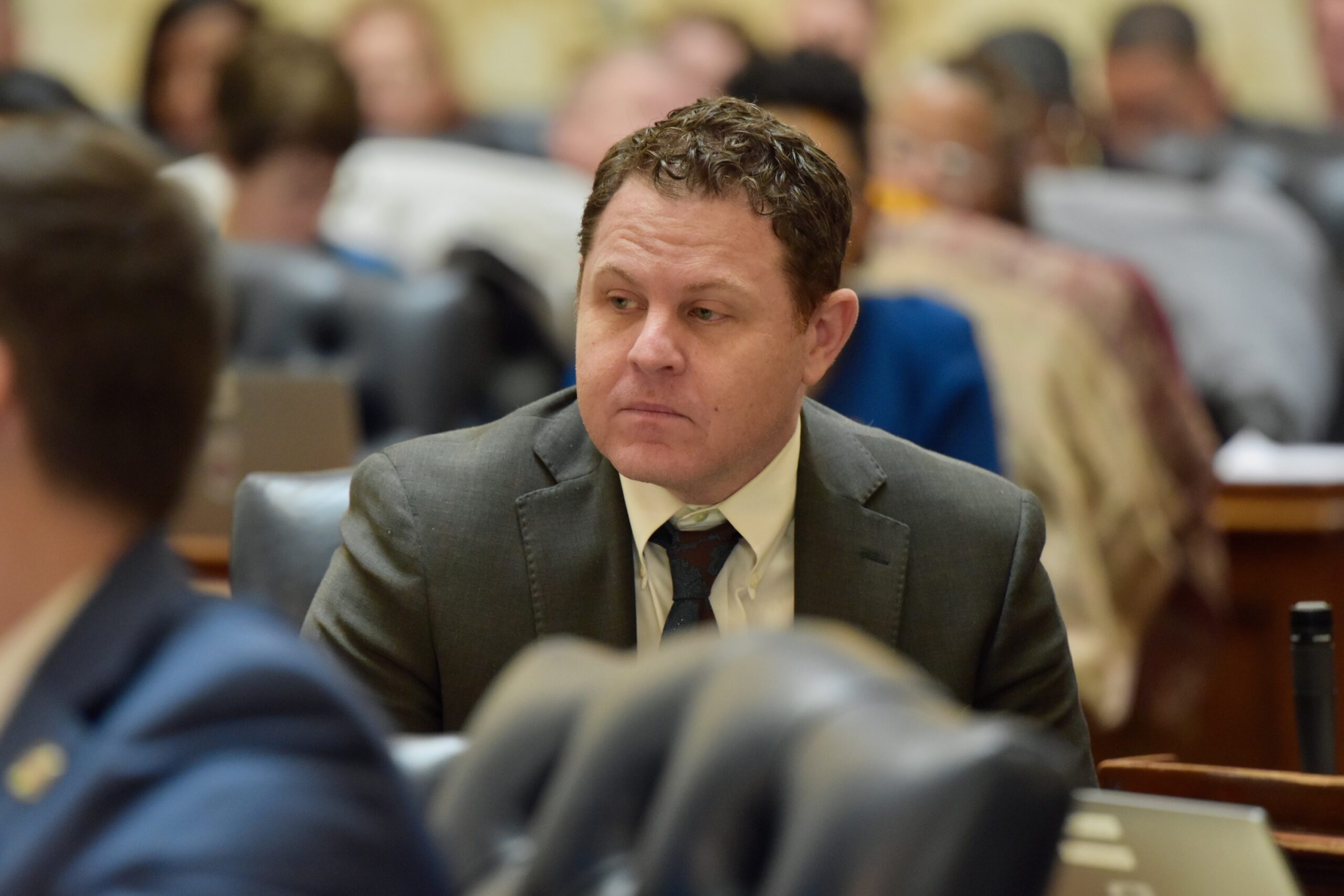Brochin, Women’s Caucus, #MeToo Kept Pressure on to Pass Sexual Predator Bill

If it weren’t for the #MeToo movement, and a threat to take on a powerful committee chairman directly, a bill intended to help prosecutors win convictions in sexual assault cases would likely have died again this year.
Instead, advocates for the measure found themselves back in Annapolis last week celebrating, as Gov. Lawrence J. Hogan Jr. (R) signed the measure into law.
The Repeat Sexual Predator Prevention Act of 2018 (SB 270, HB 301) gives prosecutors the opportunity to introduce evidence of a sex-crimes defendant’s “other bad acts.”
“We just had a trial where a woman said she was sexually assaulted while she was having a massage,” said Debbie Feinstein, Montgomery County senior assistant state’s attorney. “And there was another woman victim who said the same person had sexually assaulted her while she was having a massage. We argued to the court that that evidence should come in. [But the judge said] ‘No, that’s not coming in.’”

Gov. Lawrence J. Hogan, center, signed the Repeat Sexual Predator Prevention Act of 2018 into law May 8. Seated next to Hogan is Senate President Thomas V. Mike Miller Jr., left, and House Speaker Michael E. Busch. Photo by Bruce DePuyt
When the law takes effect Oct. 1 prosecutors will have the opportunity to use such evidence in court. They said it will be particularly useful in cases involving adults who prey on children, in which assailants often use the same tactics repeatedly.
“I think it’s a game-changer,” said Sen. James Brochin (D-Baltimore County), chief sponsor of the legislation in the Senate. “It’s just going to take the worst of the worst and hold them accountable and put them behind bars, so they can’t do it again.”
Advocates said most states already have laws that allow evidence of a sexual predator’s other criminal conduct to be entered as evidence, and that Maryland’s laws have been slow to evolve.
“This evidence gets in for other crimes, like a burglary, like a robbery,” said Joyce Lombardi, State House lobbyist for the Baltimore Child Abuse Center. “But as soon as there’s a whiff of sex, trial judges are like, ‘No!’ And they keep it out.”
It was an article Lombardi wrote as a law school student, in the 2004 University of Baltimore Law Review, that caught Brochin’s eye, and he’s been introducing the bill ever since. It has always been approved by the Senate, he said, only to die in the House of Delegates.
Brochin is now a candidate for Baltimore County executive, which he said frees him to be more candid about the workings of the General Assembly.
“I can certainly speak freely now because I’m not in the legislature [and no longer need] to worry about my bills getting passed anymore,” he said.
“After watching [House Judiciary Committee Chairman] Joe Vallario and the committee kill the bill year after year after year, I had a fantastic [House co-sponsor] in [Vanessa] Atterbeary, and she got the Women’s Legislative Caucus behind her, and they went to the speaker’s office and just said, ‘Enough.’ And he listened.”
Atterbeary (D-Howard) is the House deputy majority whip.
An email to Vallario (D-Prince George’s) requesting a comment was not returned.
Alexandra Hughes, Speaker Michael E. Busch’s chief of staff, said in a statement: “The Speaker worked with Delegates Atterbeary, [Kathleen M.] Dumais and [Luke H.] Clippinger to come up with a compromise that could pass the Judiciary Committee this year. He is pleased that this bill was signed [May 8].”
When it appeared that the committee intended to bottle up the measure again this session, a group of female legislators, Republicans and other advocates threatened to invoke a rarely used parliamentary procedure known as the “nuclear option” to bypass the House Judiciary Committee, Marylandreporter.com reported. Shortly thereafter, Vallario agreed to schedule a vote, and the bill passed unanimously, according to the news website.
“I never thought I’d live to see the day when we could get it out,” Brochin said. “There is no doubt that if it weren’t for the #Me Too movement, and Del. Atterbeary and the women’s legislative caucus putting it as their number one agenda, I have no doubt in my mind this bill would have died again.”
Experts say the bill is crafted narrowly in order to protect the rights of defendants.
“Other bad acts” evidence can only be used in cases where the defense is arguing consent, or “she wanted it,” or where a child victim is accused of lying about an assault. And the evidence can only be used in rebuttal.
Despite his criticism of Vallario, Brochin said the chairman produced a thoughtful bill.
“It just shows how intelligent Vallario is and how helpful he can be, if pressed to be that way,” Brochin said. “Because we ended up using the version that he wrote.
“There has to be evidentiary hearing outside of a jury, it has to be in the judge’s chambers and the defense is allowed to cross-examine the prosecution witness. Those are all reasonable things, and it should have those safeguards in there. … But Joe could have written them 10 years ago and he didn’t,” Brochin said.
“I think it’s going to make a big difference in our ability to prosecute sexual offenders,” Feinstein said. “This new law creates a lane for us to be able to provide that information to the judge or jury under specific circumstances. In many cases you will see someone who is a repeat offender, and under the prior law, we just didn’t have a clear lane to try to get this evidence in.”
Lombardi said Brochin deserves credit for immediately grasping the issue — and for pushing the legislation, despite all the setbacks, since 2004.
“Repeat offenders get away with far more than they ever should. Our laws are so restrictive that the repeat sex offender has more advantages than other criminal defendants,” Lombardi said. “He was a huge advocate.”




 Creative Commons Attribution
Creative Commons Attribution